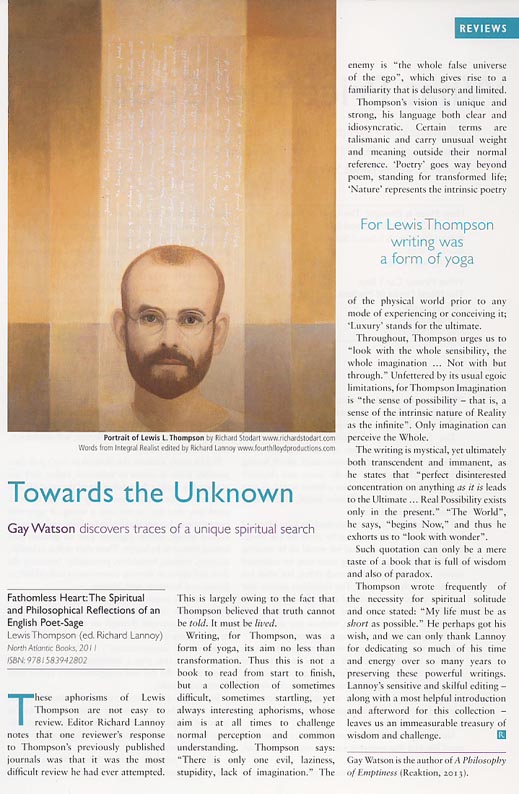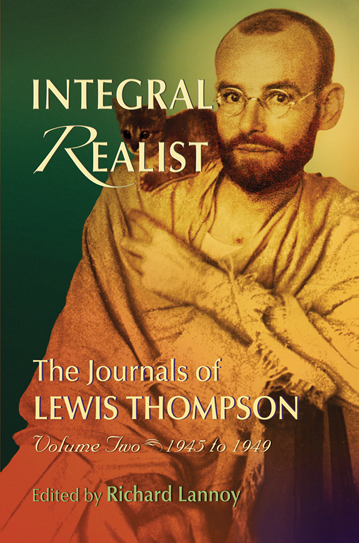
Resurgence and Ecologist
March/April 2013. No.277
Portrait of Lewis Thompson by Richard Stodart
www.richardstodart.com

Resurgence and Ecologist
March/April 2013. No.277
Portrait of Lewis Thompson by Richard Stodart
www.richardstodart.com
F o u r t h L l o y d P r o d u c t i o n s

Edited by Richard Lannoy
ISBN: 978-0-971-78065-1
pages 426
Buy companion Volume Two:
Lewis Thompson
Journals of An Integral Poet
home page
Biography of Lewis L. Thompson
From the introduction by Richard Lannoy
“Lewis Levien Thompson was born on January 13, 1909, in Fulham, then a London suburb. He spent most of his childhood in London, but never forgot the spell of enchantment which hung over the home of an aunt and uncle at the Priory, West Molesey in Surrey, where he spent many idyllic summers. Photographs show a sensitive and smiling boy in possession of a secret joy he could share with none. He had a conventional education for a middle class boy of those days up to the age of sixteen at Loughton School for Boys, was keen on drawing and showed some talent for the piano, but left without showing any great scholastic distinction. Along with his two younger sisters, Margot and Irene (known as Réné), Lewis had a strict Protestant upbringing. His mother had some Irish blood; his partly Jewish father, who came from Gosport, ran away at eighteen to join the Fifth Dragoon Guards, served in India and was later at the siege of Ladysmith, a grim and protracted event during the Boer War, with General Baden Powell, founder of the Boy Scouts movement, as his commander. “
Integral Realist chronicles the last four years of Lewis Thompson’s life. He openly draws us into an antithesis in his character – classic (Apollo; Shiva) and romantic (Dionysos; Krishna) – that he tried to resolve in sahaja against a backdrop of the most powerful Indian spiritual figures of the day: Sri Anandamayi Ma; Krishnamurti; Sri Krishna Menon; Sri Aurobindo;
Sri Ramana Maharshi, as well as Western figures: Rimbaud, Shakespeare, Dostoievski, Kierkergaard, Christ, Cocteau, Yeats and Blake, among them.
This very private companion to Lewis Thompson, Journals of an Integral Poet, Volume One 1932 – 1944, reveals a mature Thompson at the height of his commitment to “Absolute Perfection” – an ideal by which every object is completed as symbol. He understood that completion was possible only by resolving the antithesis of “Sensuality” and “Intellect” within the context of integral, flexible, incalculable and organic “Poetry” in all domains. Poetry as such controlled carelessness, frivolity and subtle exploitation of others, and allowed for true form, economy of action and expression, true perspective, simplicity, objectivity and natural rights where others were concerned. “One looks towards the Heart, itself prior even to Truth. . . by desiring, worshipping, at every moment, in every occasion, Truth – deeply, with love, humility, fidelity”.
Thompson’s nature and personal ethic were those of a spiritual man, a sadhaka whose values become “Human” only through the fulfillment of “Trans-human” clarity and perfect spontaneity: “He is a sadhu,” said Sri Anandamayi Ma. “You have been doing sadhana since your babyhood,” the Vedantic sage, Sri Krishna Menon, said to him. With the exception of his good friend, Deben Bhattacharya, few enjoyed his quality of utsaha – a kind of daring, fiery zeal, zest and recklessness that passive souls mistake for violence or tension – and its more integral, flexible, incalculable, and organic perspective of simplicity and objectivity. Hence, his friends, Ethel Merston, Earl Brewster (who likened him to D.H. Lawrence) and Blanca Schalmm, who said ”You live in another world”, could appear to him barbarous and calculating, and he to them monstrous. “He is a monster,” Ella Maillart confessed. A large part of this volume is devoted to his working out this tension with them, and with Sri Krishna Menon, and accepting what simple people on the street in Benares saw in him: “Prem Sahib” or “Prem admi” – a loving man: “No simple heart has ever found me ‘impossible’”.